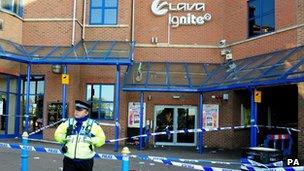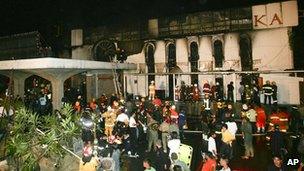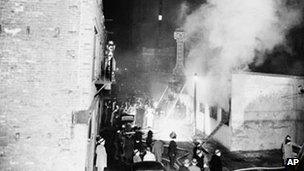Nightclub tragedy highlights the dangers of crowds
- Published

Lava Ignite's licence will be reviewed on Monday but there are no plans to reopen it as a nightclub
Earlier this week a second woman died as a result of a stampede at a nightclub in Northampton. The tragedy has highlighted the dangers of large crowds.
Every week, hundreds of thousands of people visit nightclubs around the UK, but the deaths at the Lava Ignite club in Northampton in October, though rare, highlight the dangers.
Abigail Atakora, a University of Kent student, was enjoying a fun night out until she got caught up in a rush for the exits.
Miss Atakora, who lost consciousness and spent two days in a life support unit, told the BBC: "I could have been one of the ones who died - I am one of the lucky ones."
Under the 2003 Licensing Act nightclubs require a licence, just like pubs and other venues serving alcohol.
The licence, which is granted by a special panel set up by the local authority, states what is allowed on the premise, what hours it can operate and various conditions.
Lap-dancing clubs, for example, need a special licence, as do venues which offer live music.
Under the act, the main priorities are public safety, the prevention of crime and disorder, the prevention of public nuisance and the protection of children from harm.
Fire is considered the biggest danger in most nightclubs, and all UK clubs must have fire safety certificates as well as paperwork relating to the electrics and the ceilings.
The Regulatory Reform (Fire Safety) Order 2005 insists that fire risk assessments must be carried out regularly.
That assessment will include identifying a capacity limit for the premises and ascertaining if the management have an evacuation plan that is feasible.
Sometimes safety and security are in conflict.
An example is a fire which broke out at the Stardust club in Dublin in 1981.
In the panic dozens of people ran into the men's toilets, mistaking the door for the exit. They were then trapped because the windows had metal plates and iron bars on them, to prevent people sneaking into the club.
The blaze killed 48 people.
Random checks
Most local authorities carry out random checks on nightclubs during Friday or Saturday nights, checking for signs of overcrowding and making sure emergency exits are not blocked.

Nabila Nanfuka (left) and Laurene-Danielle Jackson died of injuries received during the crush
Clubs can be closed immediately if they are found to have broken the terms of their safety certificate.
Northamptonshire Police are in the midst of an investigation into the events in the early hours of 19 October and point out they have not arrested any members of staff at the club.
Northampton Borough Council suspended the club's licence the following day but a full licence review hearing will take place on Monday.
Luminar Leisure, the company which owns the club and 75 others around the country, has since gone into administration and has said it will not reopen the Northampton venue.
On the night, Luminar had hired the club out to a promoter for the DNA Presents Wickedest Wickedest event and 1,000 tickets had been sold in advance, many of them in London, with more available on the door.
The event was due to finish at 4am and one witness, James Adetula, 21, said a "stampede" had begun as people made for the exits when they were told their coaches were about to leave.

More than 60 people died in this Bangkok nightclub fire in 2009
It appears a crush developed on a stairwell leading to the exit. Nabila Nanfuka, 22, from Neasden, north London, died on the night and 19-year-old Laurene-Danielle Jackson, from Wembley, north London, died of her injuries this week.
The venue had a capacity of 1,600 and one of the issues the police are investigating is whether that had been exceeded on the night.
'Heavily regulated'
But a spokesman for Luminar told the BBC: "The club management had a door-counting procedure in place on the night and the police investigation will demonstrate that."
He said the late-night industry was "heavily regulated" in the UK, and Luminar had its own health and safety team which carried out checks in addition to those of the local authority.
On Wednesday the Independent Police Complaints Commission announced it had begun an investigation into Northamptonshire police's actions before and during the night of 18-19 October.
In 2003 a stampede on an exit stairwell at the E2 nightclub in Chicago led to 21 deaths. That incident had been sparked by bouncers letting off pepper spray during a fight on the dancefloor.

The 1942 Cocoanut Grove fire in Boston is the worst ever nightclub incident
It later emerged the club's owners had ignored a court order to close one floor of the club and they were jailed.
As the police investigation into the Lava Ignite incident continues relatives of the two dead women, both university students, are left to grieve.
This week the head teacher of Miss Jackson's old school in Harlesden, Geraldine Freear, paid tribute to her: "She always had time to listen and mentor younger pupils. She was a bright, young student with so much to offer in her life."
The Jackson and Nanfuka families will hope the police inquiry will give them answers to explain how and why their loved ones died.
- Published9 November 2011